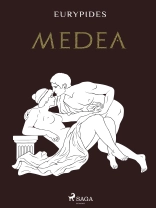Zauberei, Eifersucht und Kindsmord haben ‘Medea’ zu einem der berühmtesten Dramen der griechischen Antike gemacht. Die Königstochter Medea hat für ihren Liebhaber Jason alles aufgegeben, ihre Familie verraten, zwei Söhne geboren und ihm geholfen, das Goldene Vlies zu stehlen. Doch im Exil in Korinth beschließt Jason, die dortige Königstochter zu heiraten. Dieser Verrat treibt Medea in die Verzweifelung und zur äußersten Tat. In seinem Stück erweckt Euripides eine der schillerndsten und kontroversesten Figuren der griechischen Mythologie eindrucksvoll zum Leben.
लेखक के बारे में
Euripides (480–406 v Chr.) ist einer der bekanntesten großen Tragödien-Dichter der griechischen Antike. Von seinen rund 90 Tragödien sind lediglich 18 erhalten, die jedoch zu den meist gespielten Stücken auf westlichen Bühnen zählen. Zu seinem Leben ist neben der regelmäßigen Teilnahme an den Tragödienwettbewerben in Athen wenig bekannt.












